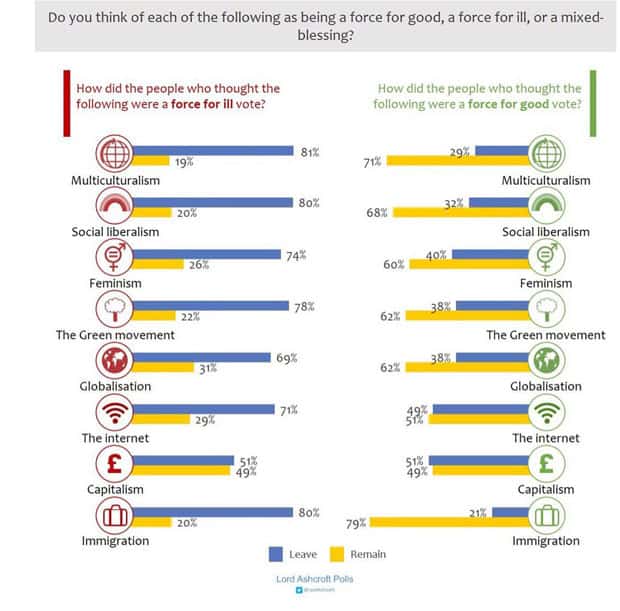As Britain Decided Its Future, Striking Parallels with U.S. Political Debates Emerged
Dan Balz, Washington Post, June 24, 2016
{snip}
On both sides of the Atlantic, political establishments and the elites have found themselves on the defensive. Rising resentment over the fallout from globalization and the effects of the financial collapse of 2008, which has widened the gap between the rich and everyone else, has divided voters in Britain and the United States.
Added to that are emotional issues of national and cultural identity at a time of growing demographic diversity, highlighted in both countries by often-angry debates over immigration. Both Trump and those pushing for Britain to leave the European Union have found the immigration issue to be their most potent political weapon.
Trump’s slogan, “Make America Great Again,” could easily have been adapted to the messaging of those in the “leave” campaign across the pond. Here, that desire for a return to an earlier time–to make Britain great again–is expressed through the issue of control.
{snip}
Distrust with political establishments cannot be overstated, on either side of the Atlantic. During the debate here, Michael Gove, a Conservative Party lawmaker and a leading voice in the “leave” campaign, sought to discredit studies warning of the economic consequences of leaving. “People in this country have had enough of experts,” he said.
This has not been a year in which the voices of political leaders have carried much sway. In the United States, Republican leaders stood powerless as Trump rolled through the GOP primaries. Hillary Clinton enjoyed the overwhelming support of the Democratic establishment, yet Sen. Bernie Sanders of Vermont ignited a progressive uprising that forced her to battle to the end of the primaries.
{snip}
{snip} The choices in the two countries may be different, but what animates the sentiment behind the votes springs largely from the same set of grievances. Even the contours of the electorates are similar. Here, as in the United States, voters are polarized along recognizable lines: young vs. old; college-educated vs. non-college-educated; urban vs. small town and rural.
A SurveyMonkey online poll showed that voters younger than 45 favored the “remain” campaign, with the very youngest overwhelmingly in favor. Those 45 or older supported the “leave” campaign. Similarly, those with a college degree supported the “remain” campaign by a nearly 3-to-1 margin. Those without a degree favored the “leave” campaign, though by a narrower margin.
Chris Hanretty, a specialist in politics at East Anglia University, wrote in the Observer recently, “Older men and women without educational qualifications are very likely to vote for Britain to leave the E.U.–not because they’re stupid or uninformed but because over the past 40 years their relative position within society has worsened.”
The poll also showed the significance of the immigration issue among those favoring a Brexit, just as immigration issues were the most powerful force behind Trump’s rise.
By better than 2 to 1, those here who cited immigration as their most important issue said they would back Britain’s exit. Those worried about the economy, poverty and inequality, or defense and foreign affairs, all backed remaining.
{snip}
[Editor’s Note: The graphic below illustrates the split between Leave and Remain voters.]
















